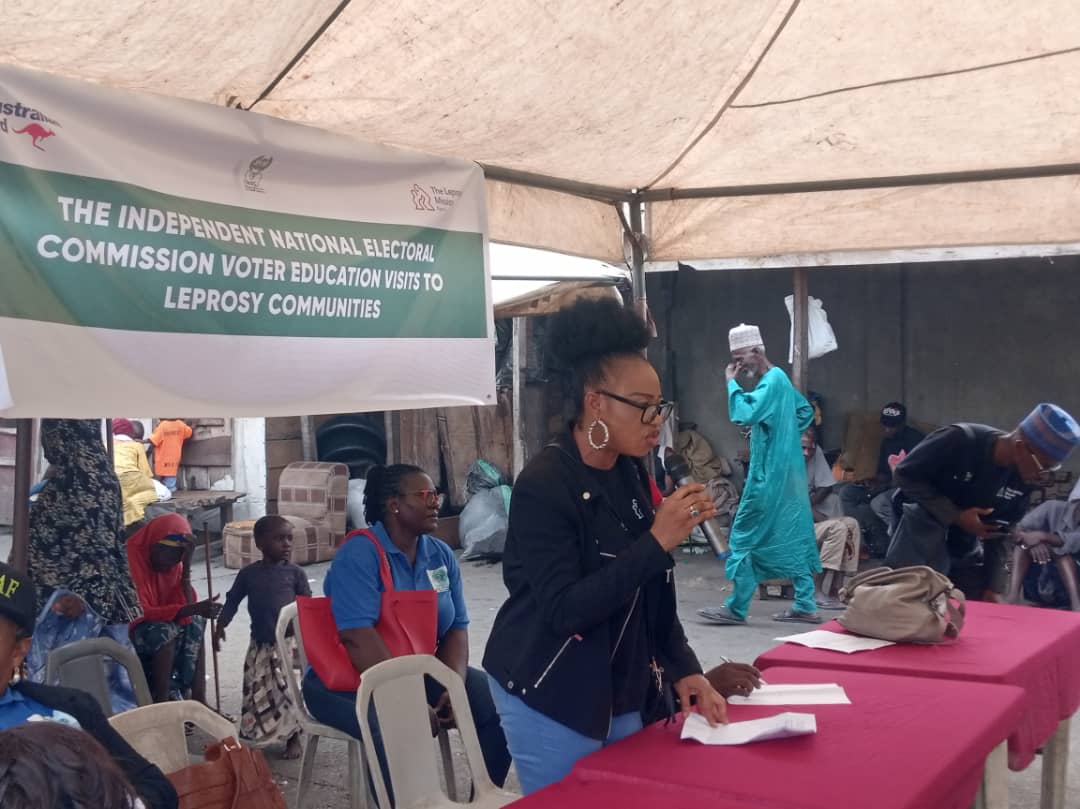By Adekunle Williams,
The Independent National Electoral Commission (INEC) has assured persons affected with leprosy that plans are underway to ensure they participate fully in the forthcoming general elections without being stigmatised.
The commission’s Head of Disability Unit, Mrs Benny Oguejiofor, made this known at the sensitisation programme for Persons Affected with Leprosy in Okobaba Community in Lagos on Wednesday.
Oguejiofor said the commission would ensure proper implementation of the new electoral law which protected the rights of lepers and other persons with disabilities in the forthcoming general elections.
She said that over the years lepers had been stigmatised against and this had prevented victims from coming out to exercise their voting right at any election, “because people believed their ailments were contagious”.
Oguejiofor said INEC in collaboration with the Leprosy Mission in Nigeria had organised the programme basically to educate persons affected by leprosy, on what INEC had put in place for them during the election.
The official added that the sensitisation was also to mobilise them to come out with their PVCs on the election day and vote for the candidates of their choice without any form of stigmatisation.
“Everyone is aware that the society is always discriminating against them (Lepers). So, People do not want to come closer to them during the election but that will be taken care of during this election.
“This programme is an opportunity to tell these special people that they are human being like us.
“We are open to them and the commission is ensuring that everybody that has his or her PVCs can vote on the election day, just like any other person.
“There is an inclusiveness for persons with disabilities and persons affected with leprosy to vote in this forthcoming election,” the INEC official said.
According to her, in 2013, the commission created the disability unit and the gender equity department sometime this year “to cater for these special people before and during the election”.
She said that these departments were to ensure that persons marginalised were mainstreamed into the electoral process whether they are youths, women or persons with disabilities.
Oguejiofor said the commission in collaboration with International Foundation for Electoral System (IFEC) had also come up with a framework to ensure every barriers that they faced during the election were reduced if not totally eliminated.
She noted that the commission had also employed these marginalised group as staff and would also engage them during the ad hoc staff recruitment to ensure that they were part of the system.
Oguejiofor said that as part of the mechanism put in place by INEC, priority voting would be used for people with disabilities at the polling unit on the election day, adding that the electoral officers had been trained to attend to them first.
The official said the commission would make available assistive devices to aid impaired voters at the polling units.
According to her, these assistive devices include: braille ballot guide, magnifying glasses and posters for the deaf to ensure the participation of persons with disabilities during the election.
“We have also put in place mechanism where persons with hearing impairment can look at the poster on the wall to follow the voting procedure.
“Also, persons with disabilities are allow to come to the polling unit with a person of their choice which is in tandem with the new Electoral Act 52 Subsection 2 of 2022 as amended.
“We have what we call the Braille Ballot Guide in form of jacket that persons who are blind can use on an election day to cast an informed vote,” she said.
Ms Jika Baruwa, an official of the Leprosy Mission in Nigeria, noted that the mission had been working in Nigeria for over 150 years in the area of leprosy to ensure treatment and provide medication service for persons affected with leprosy.
Baruwa said that, following several advocacies with INEC, the mission arrived at the sensitisation of leprosy community in Lagos on voters education.
“Overtime, persons affected with leprosy have been excluded in the voting process because they are without their fingers and hands and that way they cannot vote.
“Knowing that our current voting system has to do with thumb printing, they were excluded but with several advocacy and sensitisation, the government has heard our messages.
“Therefore towards this election, there are special machines and equipment that will now use their faces to cast their vote just like any other citizens in Nigeria,” she said.
Earlier in his opening remarks,, the commission’s Disability Desk Officer, Lagos State, Mr Luka Buba said INEC was ready to improve voters education for persons with disabilities and affected with leprosy in the state.
Buba appealed to Nigerians not to be scared of the lepers when they come out to cast their vote on the election day. (NAN).


